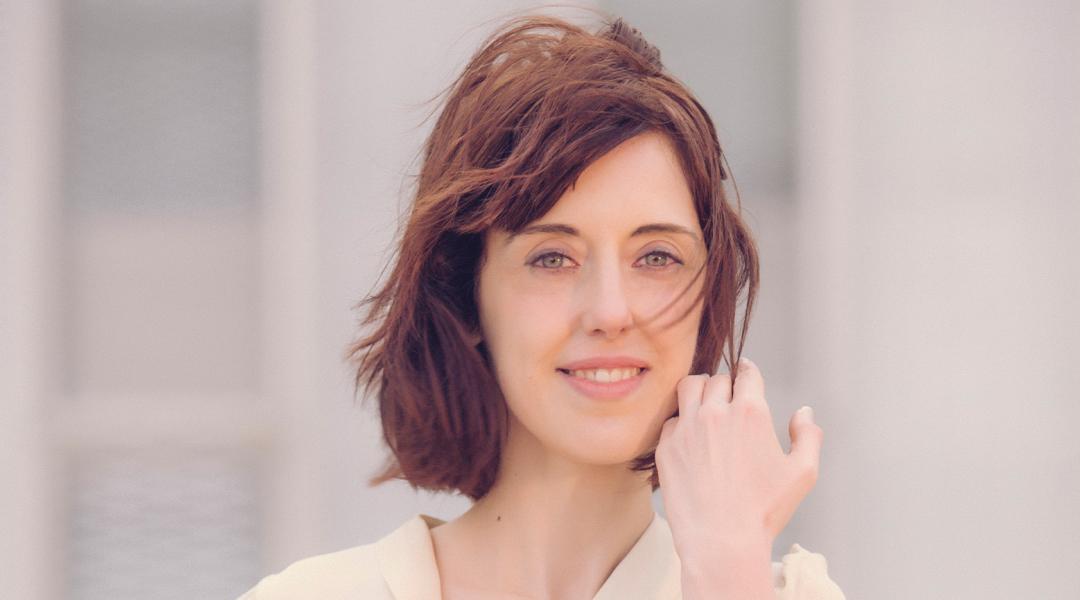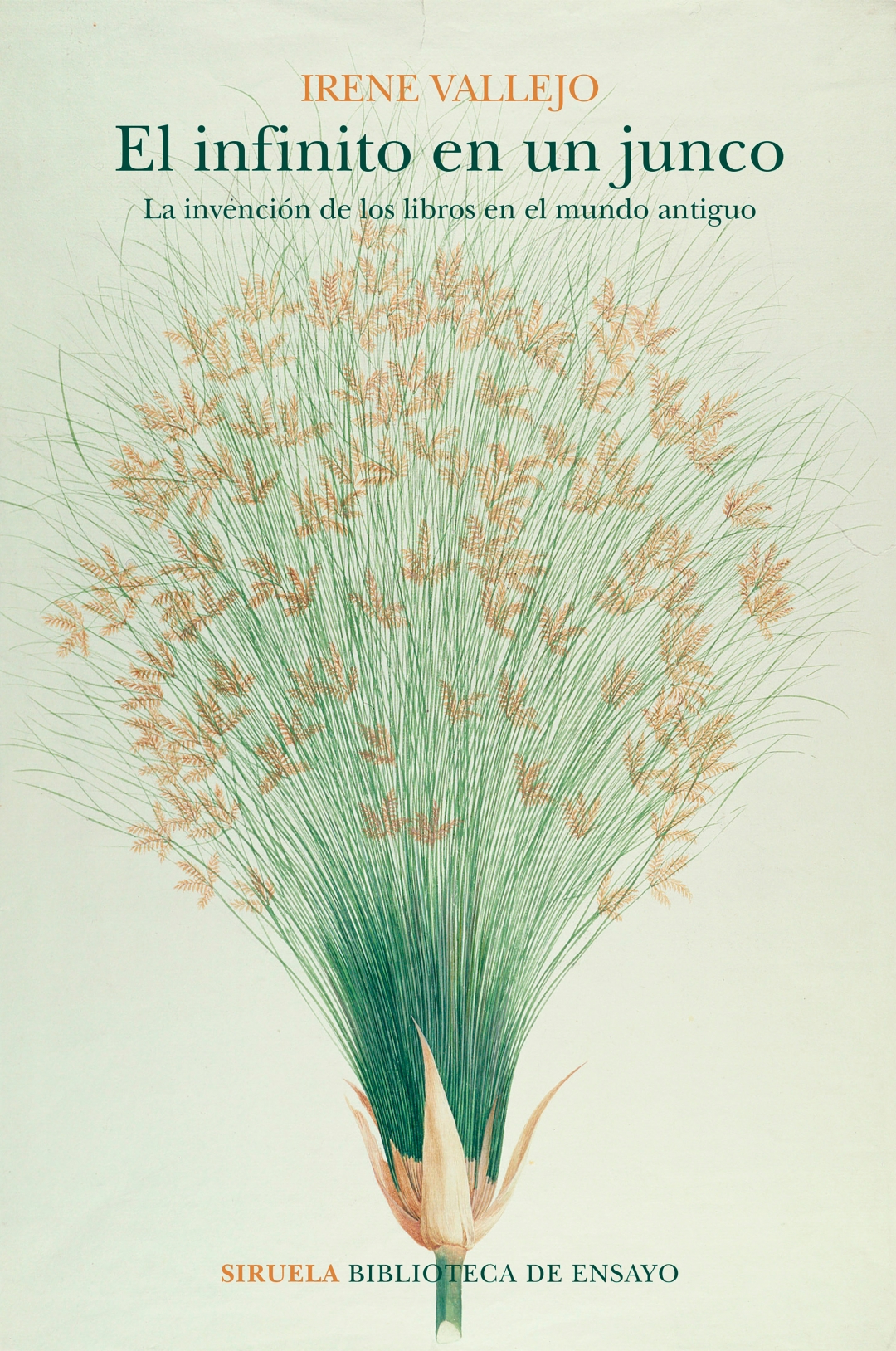Irene Vallejo
All the Truth About Lifesaving Books

Immersed in an endless promotional tour, amidst talks and interviews, we stole some valuable time from writer Irene Vallejo, author of El infinito en un junco [The infinite in a Reed], to chat about the pleasure of knowledge, reading and the art of lending books, the best way, according to her, to get rid of them.
Fresh from winning the 2019 Ojo Critico Award for Fiction, Irene Vallejo (Saragossa, 1979) has seen her essay El infinito en un junco (Siruela) become, in just a few months, one of the books of the moment and one of the most candid exercises on the importance and the vindication of classic culture.
Just by looking at it, El infinito en un junco seems to be born from a fascination for books and the classic world, doesn’t it?
In El infinito en un junco I focus on themes I was fascinated about during my time doing academic research, such as the frailty of books and their tenacious survival. In this essay I approach this story using narrative tools. I think the journey of words through the centuries and their fight against oblivion is a great adventure.
Where does that obsession about classic culture come from?
It comes from my childhood, from the happiness of being read bedtime stories. One night, my father, sitting on the side of my bed, announced a long and passionate story to me: “Have you ever heard about Ulysses?” My ear’s cochlea welcomed in sirens, cyclops, islands, storms, the sack of winds, Nausicaa on the beach, Calypso in her garden, Circe concocting magic potions, Penelope weaving and unweaving… Greek mythology has become my home ever since. My curiosity for the ancient world that created these legends is insatiable.
“The journey of words through the centuries and their fight against oblivion is a great adventure.”
In your case, why did you become a writer? What are your “foundational” readings?
When I was a child, I read Greek, Roman and Norse mythologies. Then I went on to read Jack London, Dickens, Chesterton, Conan Doyle, Stendhal, and Conrad. I think I’ve become a writer because, as a young girl, I was thirsty for stories. I would ask all adults to tell me one, but since they weren’t able to provide me with the increasingly higher doses my addiction craved, I started making my own.
The book as an object and as a depository of knowledge is one of the greatest artefacts invented by mankind. However, it seems to be going through hard times. Do you think it will recover its prestige?
It’s true that, up until now, books hadn’t had to compete with so many leisure alternatives. At this point in time, whoever chooses to read a book is foregoing the temptation offered by other options, from social media to TV series. But books have faced even more terrifying threats over their thirty centuries of history: plundering, wars, widespread illiteracy, poverty, bonfires, systemic censorship… If books have managed to survive all those dangers, I would certainly say they will overcome today’s challenges.
“Whoever chooses to read a book is foregoing the temptation offered by other options, from social media to TV series”
Your book has been defined as an essay, as a travel book, as an adventure book… How would you define it yourself?
El infinito en un junco is, literally speaking, an essay, an attempt, a quest, an experiment and somehow, a game. I’ve been interested from the outset in reconstructing the journey of books through history as if I were writing an adventures book. That’s why the story begins with disturbing horsemen going on a mysterious search and arrest mission.
As I was reading the book, it reminded me of two recent books: Susan Orlean’s The Book Library and Violet Moller’s The Map of Knowledge. Books about books. Is this almost a literary genre?
The book that rekindled my joy and hope for essays in Spanish was Sergio del Molino’s La España vacía [Empty Spain]. The genre is experiencing a great moment because we want to learn more beyond our specialty. Someone expressing knowledge in a transparent and amusing way has the ability to expand our universe.
You also talk about how difficult it is to get rid of a book, to destroy it or to throw it away. Have you ever got rid of a book?
I only throw away worn books. I donate the ones I won’t re-read to public libraries and NGOs. Libraries have gone through difficult times, with cuts in budgets or non-existent ones. In any case, the surest way to get rid of a book is to lend it to someone.
At some point in your essay, you make a defence of comedy and laughter, which seem to be stigmatized in high culture. So much that Aristophanes, Kundera and Chaplin were regarded as dissidents. Why is that? What, in your opinion, is the highest genre?
I’m allergic to hierarchies, I’ve always been a happily promiscuous reader. In my childhood, comics, Stevenson and mythology coexisted in joyful polygamy. I think it’s dangerous to believe in labels because they’re just useful simplifications to aid classification. If they aren’t useful, if they divide or marginalize, they should be avoided. Prompting laughter is so hard that, in my opinion, comedy should be vindicated. Humour is an ingredient I’m always grateful for, even in drama, poetry and essays. But it has to be the kind of humour that doesn’t attempt to hurt. It must take a carefree, witty, even absurd stance towards life’s tragedies. Tears of laughter wash our eyes as much as tears of sorrow.
“Prompting laughter is so hard that, in my opinion, comedy should be vindicated. Humour is an ingredient I’m always grateful for, even in drama, poetry and essays”
The book has been praised by many writers and has received the 2019 Ojo Crítico Award. Are you satisfied?
Writers work alone, in the open. Being in that windswept moor, the Ojo Crítico Award has brought me joy, hope and shelter. It has opened many doors and given me many opportunities. I’m especially enthusiastic about it because I’ve been listening to that RNE program since I was a teenager. Thanks to El Ojo Crítico, I’ve explored many authors, books, discoveries and new directions over the years. I would like to thank the jury members for their courage to give an essay a fiction award and thus vindicate the literary value of non-fiction books.
Can books change our lives?
During an especially difficult time about which I talk about in El infinito en un junco, I was saved by the voices of writers talking to me from their books. Nico Rost tells in his diary Goethe in Dachau how prisoners in concentration camps clung to their memories of the books they had read in the past in order to survive. The leading character and his mates create a clandestine book club for which they’re willing to take great risks. Literature doesn’t have a clear use, but it helps us make sense of our experience. Making sense of life saves us.

Cover of the essay ‘El infinito en un junco’, by Irene Vallejo. Published by Siruela



